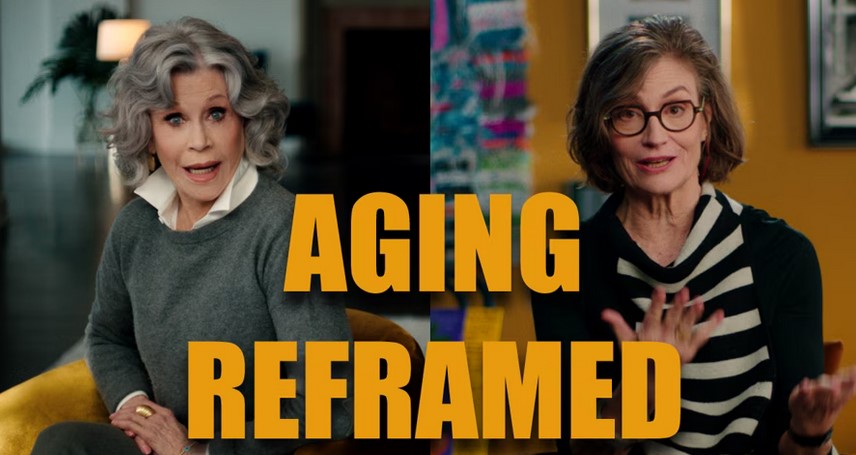By Helen Hirsh Spence
Estimated read, 4:09 min.
Image: Left to right, Jane Fonda and Ashton Applewhite
This year Top Sixty Over Sixty has the perfect holiday gift for you. Or rather, Jane Fonda and Ashton Applewhite do. The gift is an additional 7.5 years of life IF you follow their advice from the video, mentioned below.
I found Jane and Ashton’s short video, Aging Reframed positively inspiring. Together, they explore the ways older people are often marginalized and discuss how we can reframe aging as a graceful, positive, and empowering experience. WATCH HERE to discover a fresh perspective on the beauty and value of growing older (4:04 min)
I asked Ashton how this compelling video came into being because it’s exactly the kind of messaging we need to share worldwide and all the time to drown out all the negativity surrounding ageing. She told me that she met the producer by chance in her Brooklyn neighbourhood and he engineered the production. She never even got to meet Jane.
If you watched my TEDx talk (released in July), you’ll recognize the longevity research by Dr. Becca Levy that they were referencing, as well as that of Jonathan Rauch, author of The Happiness Curve. Need a refresher? Please take another listen to my talk HERE and help raise the number of views on my talk. (It helps if you view it, comment, and share it).
This brings me to the crux of this final blog of 2024. How many people understand that we are in a demographic shift upwards? How many truly grasp the magnitude of the negative impacts caused by ageism? There is plenty of research to substantiate that ageism is a global health epidemic, but is the message getting through?
Here is a recap of some of the numbers:
- The World Health Organization came out with their Global Report on Ageism in 2021. Their findings indicated that one out of two people is ageist against older adults.
- In 2020, The National Poll on Healthy Aging conducted by the University of Michigan revealed that 82% of adults between the ages of 50-80 experienced one or more forms of ageism in their daily lives.
- The Canadian Coalition Against Ageism (CCAA) commissioned a survey by Ipsos (October 2024) which concluded that 87% of Canadians over age 25 failed to “grasp the widespread prevalence of ageism”. In other words, they don’t get it!
The numbers above illustrate that there’s a lot of work to be done to raise awareness about ageism: its various forms, and its impacts on individuals, society and economies. The facts about the current boom in older adults were anticipated widely before David Foot and Daniel Stoffman published their best seller, Boom, Bust Echo: How to Profit from the Coming Demographic Shift, in 1996. This new reality still hasn’t sunk in.
We’ve also known for many years that fertility rates globally are in decline. In Canada today the number of babies per woman is 1.26; in the U.S., the numbers are slightly higher with 1.6 babies per woman. We are no longer able to replace our populations, immigration is down, and we are suffering from a severe talent shortage.
I get calls every week from experienced, competent older people (mostly women) who are desperate to find employment. Unfortunately, they can’t even get past the initial recruitment step, submitting their resumes and cover letters. The situation is frightening, frustrating and futile. It leaves older applicants with a feeling of helplessness and hopelessness that adds to their sense of lost self-agency and self-confidence.
There are now more older adults in Canada over the age of 65 than youth under the age of 14. Where do employers think they will find the staff to carry on their businesses?
I won’t belabour my usual rant, but I ask you, our readers, what are you prepared to do to raise awareness about ageism and challenge the outdated notions about ageing? Are you willing to contradict a friend who suggests that you are over the hill, or aren’t dressed appropriately for your age? When you hear someone patronizing an older person at the checkout counter with words of endearment like “sweetheart” or “dearie”, will you step in to protest? And when you overhear a healthcare worker speaking to an elderly person in their care with language used with young children, “Is our tummy hungry yet”, will you interject to remind them that infantilization isn’t appropriate?
These are just a few of the actions that we all need to take to stop the spread of age bias. Ageism is pervasive and largely unchallenged. If we all take small steps to raise the volume on this overlooked human justice issue, it will make a big difference in halting the spread of these negative and faulty stereotypes about ageing.
Do yourselves a favour. Take Jane and Ashton’s advice and share their video with friends and family who need a boost. Our later lives are only partly genetically determined. The rest is within our control, and it’s never too late to start thinking positively about ageing.
Helen


0 Comments